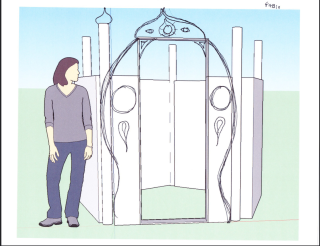Therapy
How Internal Family Systems Therapy Can Lead to Lasting Healing
Time travel, emotional homeopathy, and psychic surgery.
Updated September 2, 2023 Reviewed by Gary Drevitch

Over the years, I noticed two types of new clients: The ones that begin therapy because they don’t know why they are struggling, and the ones that know why they’re struggling, but don’t know what to do about it. The latter has discovered what the former hasn’t yet: that knowing why you keep repeating self-defeating patterns doesn’t necessarily stop you from repeating them.
That’s why instead of taking the psychoanalytic route to discover why, or the cognitive-behavioral path to manage the problem, I invite them on a mindful trip through time and space to the constellations of inner children running their lives. The mission of this intrepid expedition is not to subdue these troubled youngsters, but rather to boldly love them in a way that no one has loved them before. Only then can they willingly release their burdens into the galaxy and reconnect with their source of light.
The Inner Solar System
No, this is not a psychedelic journey. Let me bring this down to earth, and into the body.
Consider the concept of muscle memory. If you’ve ever ridden a bike, played baseball, or held a yoga posture, then you know that your body automatically remembers moves and postures it’s done before, especially those done repetitively over time. Similarly, our bodies store emotional memories, both happy and painful ones.
The stronger the impression, the larger the memory congeals in our bodies. This is especially true with traumatic memories, as Bessel Van Der Kolk points out in his signature work The Body Keeps The Score.
Even if we forget, or avoid thinking about, events that left negative impressions, our emotional body reacts to cues that remind it of the original experience and tries to protect us from feeling as awful as we once felt before. That’s why strong reactions to situations in the present are usually connected to old pain. If we traced the felt sense of the trigger through time, we will most likely land on an event or set of experiences where something hurtful happened in childhood, something our caretakers caused and/or failed to address either because they didn’t notice we were suffering, or didn’t know how to help.
Without adults to help us make sense of our experiences, we blame ourselves: “I must not be enough,” “I’m too much,” “I’m weak,” or “I’m bad." This is not only because children’s brains are developmentally self-centered, but also because it’s too scary to think the adults whose love and understanding matter most are incapable of taking care of us in the important ways we need.
In Internal Family Systems (IFS), the therapeutic modality I practice, we call these internalized beliefs “burdens” because they weigh us down and disconnect us from our natural benign self. IFS holds that everyone is born with a core “Self” that is calm, compassionate, confident, curious, creative, courageous, clear, and connected. However, we can lose touch with this wellspring of support when our natural bids for love and attention as children—for example, to be fed, held, diaper-changed, and helped with problems and emotions—are met with shame, rejection, neglect, abuse, or trauma.
Because it’s too overwhelming to constantly feel unlovable, invisible, etc., we unconsciously exile these thoughts and feelings from our conscious minds, while enlisting parts of ourselves that strategize to get our needs met—e.g., “If I get straight As, maybe dad will love me.” These protective parts are sub-personalities held in the body that present as thoughts, feelings, sensations, and images, and they behave like family members. (Hence the “family” aspect of Internal Family Systems.)
Sometimes, parts align to guard us from experiencing our deepest pain, like anxiety and avoidance, while other parts use opposing strategies, like binging and restricting. Either way, they share the same goal: Protecting us from feeling overwhelmed by entrenched beliefs that if we were to feel them in every waking moment, would make it hard to function.
Even as we grow into adults, and our capacity to reason and view life from perspective expands, our exiles continue to live inside our bodies holding our burdens, while our protective parts continue to manage and numb us to avoid stirring up old pain. That’s why we might intellectually understand that losing a job or a relationship doesn’t make us unlovable, but it can still feel like death.
It also explains why challenging our negative beliefs can feel like a temporary salve, only for the negative thoughts to return the next time the wound is triggered. (The next time you’re triggered, ask yourself, “How old do I feel?” The answer will tell you where you are frozen.)
Time Travel
That’s where time travel through inner space comes in. Using the IFS model as my map, I try to guide clients through a journey of deep-body listening, so they can metabolize the history that their parts are holding. Although there are different techniques, this usually begins with asking clients to close their eyes and sense into the something inside them that is feeling activated.
Often, I notice that clients with insight about their problems, perhaps because they've explored their past ad nauseum in talk therapy, have a fresh visceral experience encountering parts as they present in the body. Consider the difference between reading a hiking guide about a mountain, and following a trail, while taking in and appreciating sights, sounds, smells, and sounds along the way.
My goal is to help them find and witness through fresh loving eyes the wounded child suspended in inner space. But it’s not a direct flight. Behaving in the way a well-intentioned older brother or sister might, protective parts within the exile’s orbit won’t grant passage until they can trust that our wounded little ones will be met with a receptive loving energy, not some critical part that might shame it the way their parents did.
We gain the protectors’ trust by interacting with them from a place of open-hearted curiosity—what I often describe as “beginner’s heart." We might ask how they got their jobs, or what they’re concerned would happen if they couldn’t protect the exile. For example, an angry part might share “If I don’t get angry for Alice, she will absorb other people’s opinions to the point that her feelings will be squashed, and she’ll feel non-existent.” Probing further, the part may share that it witnessed Alice’s needs continually dismissed and ignored by a narcissistic parent.
When my clients can befriend these protective parts, and appreciate why they were needed to survive, it sends a message to the internal solar system that there is a new, benevolent adult in charge (aka the client’s Self) who can heal their exiles and free them from having to work so hard, so they can relax and use their gifts more constructively. For example, an angry part that’s attuned to boundary violations, can set limits, and assert needs instead of blowing its top.
Emotional Homeopathy and Psychic Surgery
Once the client’s protective system gives us permission to explore our most vulnerable parts, we can help our exiles release their burdens by witnessing what happened to them with the curiosity, compassion, understanding, love, and appreciation they needed, but didn’t get in the moment of wounding. Our loving attention helps our inner exiles feel safe enough to share the story they are holding. When we respond to them the way they wished someone had been with them before, it helps them feel deeply gotten and ready to release their burdens.
Though this process happens inside our imagination, it doesn't make it any less real than the pain we feel in our current reality. I liken this process to psychic surgery because we are essentially removing the splinters of emotionally charged beliefs that got lodged inside of the exiles in the moment of wounding so that they can experience more vitality.
Imagine, for example, if the Ghost of Christmas Past had taken Ebenezer Scrooge to a childhood memory that led to his miserly behavior. But instead of simply observing, Scrooge interacted with his younger self, inviting little Ebenezer to share what it was like growing up in poverty and neglect. Suppose the older Scrooge had responded with compassion, and helped Ebenezer feel safe, loved, and enough, so that he could release his burdens into the elements, allowing the spirit of generosity to flow through him.
As simple as it sounds, the cure for a lack of love from others, is love toward the self. Such emotional homeopathy surpasses fleeting moments of relief and insight, fueling us with the energy needed to propel us into a brighter future.




